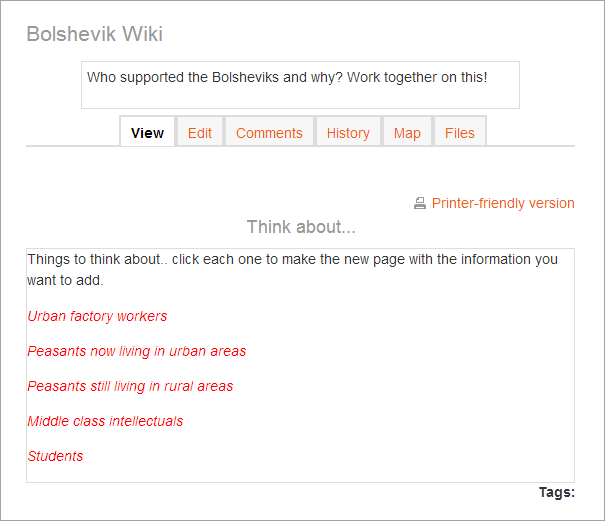Wiki activity: Difference between revisions
(→Tips and Tricks: moved a tip here) |
David Mudrak (talk | contribs) m (Text replacement - "<mediaplayer>(.*)<\/mediaplayer>" to "{{MediaPlayer | url = $1}}") |
||
| (46 intermediate revisions by 20 users not shown) | |||
| Line 1: | Line 1: | ||
{{ | {{Activities}} | ||
A wiki | A wiki is a collection of collaboratively authored web documents. Basically, a wiki page is a web page everyone in your class can create together, right in the browser, without needing to know HTML. A wiki starts with one front page. Each author can add other pages to the wiki by simply creating a link to a page that doesn't exist yet. | ||
[[Image:Wikiexample.png]] | |||
* [[Wiki settings]] | |||
* | * [[Using Wiki]] | ||
* | * [[Wiki_module_FAQ|Wiki FAQ]] | ||
Wikis get their name from the Hawaiian term "wiki wiki," which means "very fast." A wiki is indeed a fast method for creating content as a group. It's a hugely popular format on the Web for creating documents as a group. There is usually no central editor of a wiki, no single person who has final editorial control. Instead, the community edits and develops its own content. Consensus views emerge from the work of many people on a document. | |||
In Moodle, wikis can be a powerful tool for collaborative work. The entire class can edit a document together, creating a class product, or each student can have their own wiki and work on it with you and their classmates. | |||
Wiki in Moodle 2.0 video: | |||
{{MediaPlayer | url = http://www.youtube.com/watch?v=TfkunrqQVS8}} | |||
[[Category:Wiki]] | [[Category:Wiki]] | ||
[[de:Wiki]] | |||
[[es:Wikis]] | [[es:Wikis]] | ||
[[eu:Wikiak]] | [[eu:Wikiak]] | ||
[[fr:Wiki]] | [[fr:Wiki]] | ||
[[ja:Wikiモジュール]] | |||
Latest revision as of 13:40, 26 October 2017
A wiki is a collection of collaboratively authored web documents. Basically, a wiki page is a web page everyone in your class can create together, right in the browser, without needing to know HTML. A wiki starts with one front page. Each author can add other pages to the wiki by simply creating a link to a page that doesn't exist yet.
Wikis get their name from the Hawaiian term "wiki wiki," which means "very fast." A wiki is indeed a fast method for creating content as a group. It's a hugely popular format on the Web for creating documents as a group. There is usually no central editor of a wiki, no single person who has final editorial control. Instead, the community edits and develops its own content. Consensus views emerge from the work of many people on a document.
In Moodle, wikis can be a powerful tool for collaborative work. The entire class can edit a document together, creating a class product, or each student can have their own wiki and work on it with you and their classmates.
Wiki in Moodle 2.0 video:
